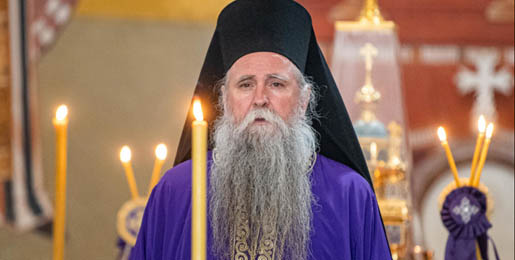Bishop Joanikije:The content of the Fundamental Agreement will be known after signing
 His Grace Bishop Joanikije of Budimlje-Niksic and the Administrator of the Metropolitanate of Montenegro and the Littoral announced that the content of the Fundamental Agreement between the Serbian Orthodox Church and the state of Montenegro will be known to the public when it is signed.
His Grace Bishop Joanikije of Budimlje-Niksic and the Administrator of the Metropolitanate of Montenegro and the Littoral announced that the content of the Fundamental Agreement between the Serbian Orthodox Church and the state of Montenegro will be known to the public when it is signed.
Bishop Joanikije explained in an interview with Vijesti TV Station that the same procedure was followed when concluding agreements with other churches and religious communities.
"The important thing is that the draft agreement is already ready. It is possible, since this process is still ongoing, that there will possibly be some small changes. There can be no more essentials because we have seen that everything is in accordance with the Constitution and in accordance with the legislation of Montenegro. It is simply self-evident what the agreement should look like. Serbian Patriarch Porfirije represents the Serbian Orthodox Church and he was the first to sign the Agreement. Of course, that is a matter for the Holy Synod of Bishops. The Synod decides who will sign the Agreement, but it goes without saying that this obligation belongs primarily to the Patriarch. If the Patriarch and the Prime Minister sign, that is the highest level, and it suits us to be the highest level on that side as well, as far as the Agreement is concerned, "Bishop Joanikije said.
He added that the agreement had been negotiated for a long time, that it had been proposed to some previous governments, but that there was no agreement.
"Now, at the level of the Church, we first discussed that issue, and then with the representatives of the Government. This is already entering the final phase and we have done everything that other religious communities have done, all those preparations during the signing of the Agreement, "the Bishop said.
Asked whether the Metropolitanate would lose its autonomy with the agreement, as some media mention, and the term "Orthodox Church in Montenegro" mentioned in the decision of the Council of Bishops from 2006 when the Episcopal Council was formed, the Bishop said that "The Metropolitanate did not gain any special autonomy", but one discussed only the "conditional independence that each of the dioceses of the Serbian Orthodox Church has, no less, no more."
"Our Church is called the Serbian Orthodox Church. It is the Orthodox Church, but its full name is the Serbian Orthodox Church. There can only be an Agreement between the two parties, between the Serbian Orthodox Church and the state of Montenegro. On the other hand, when we talked about autonomy, we only talked about the autonomy, certain, conditional independence that each of the dioceses of the Serbian Orthodox Church has, no less, no more. The Metropolitanate of Montenegro and the Littoral did not acquire any special autonomy, but it is a part of the Serbian Orthodox Church as well as its other dioceses. This agreement does not establish any new reality, nor any new subject as far as the church organization is concerned, but only the two sides express mutual respect and make it official ", explained Bishop Joanikije and emphasized that the institution of episcopal councils has existed since time immemorial, officially or unofficially.
"It has always been the custom for bishops of a certain area to meet on certain important issues and to consult on that. The Episcopal Council was established by a decision of the Holy Synod of Bishops, it still exists. Dioceses are more important, because the Episcopal Council is not registered at the state level, and our dioceses exist as legal entities. Here is the Metropolitanate of Montenegro and the Littoral for more than 800 years, and the Diocese of Budva-Niksic was founded 800 years ago. Unfortunately, it had interruptions in its life and continuity, but ot was renewed and it keeps that memory as a Saint Sava's episcopate. So the Episcopal Council still exists. "This Agreement will not delete anything, but it will not establish any autonomy or anything new, but only the agreement of the two sides that they are ready to cooperate and to respect each other and respect each other's competencies."
Bishop Joanikije said that the Agreement "does not produce anything new and nothing more than what is already prescribed by the Constitution and legislation of Montenegro", and that "in some respects the Law on Freedom of Religion, which applies to everyone, is more important". The Bishop assessed that the Agreement is much more talked about in public than other agreements between the state of Montenegro and religious communities.
"Who knew that the Agreement between Montenegro and the Roman Catholic Church was being prepared until it was announced and until that Agreement was signed?" The two parties agree on that, and when they reach an agreement, they sign, and then it is published. It is normal for it to be known to the public only after it is signed ", Bishop Joanikije concluded.
Source: Metropolitanate of Montenegro and the Littoral

